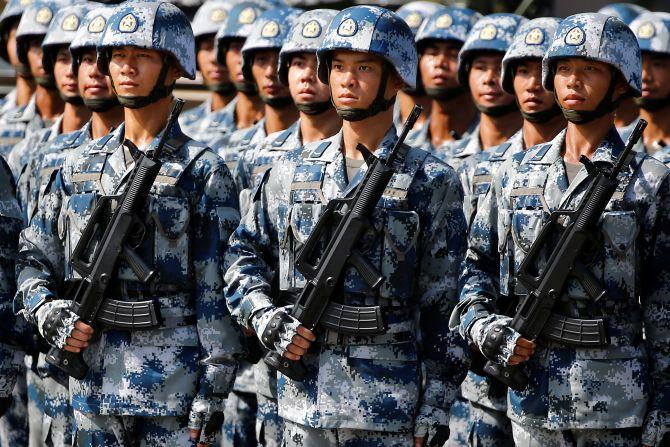'The possibility of another incursion, a probing manoeuvre in areas where Indian defences are vulnerable cannot be ruled out,' says BharatShakti.in Co-Founder Nitin A Gokhale, the distinguished commentator on national security issues.

Going beyond the headlines on the resolution of the Dolam crisis, it is important to look at China and its current dispensation under President Xi Jingping from a long term perspective rather than gloat over what is undoubtedly a tactical win for India.
Multiple miscalculations on China's part led to Beijing painting itself in a corner over one of the longest standoffs in a series of such crises since the 1980s.
While Sumdorung Chu episode in the mid-1980s took nearly eight years to be finally resolved, recent face-offs -- 2013, 2014 and this one in 2017 -- have ended relatively faster for two reasons: One, India's comprehensive national power has improved (relatively speaking), making it difficult for China to bully it over a prolonged period even though unarguably even China's economic and military capabilities have increased manifold.
Two, domestic constituencies and the rise of multi-polarity has made it tougher for bigger powers to bully smaller neighbours.
But first the Chinese miscalculations.
One, Beijing did not expect India to cross the line and come to Bhutan's aid when it became apparent that the PLA was trying to alter the status quo.
Two, China took Bhutan for granted and thought Thimphu would succumb to its pressure tactics, but it did not.
Three, Beijing unleashed a three-pronged psychological warfare by deploying its shrill media, analysts and official spokespersons in trying to unsettle India.
But the Indian government adopted a mature, calm and assured approach refusing to take the Chinese bait, further infuriating Beijing.
Despite Chinese provocations India kept the diplomatic engagement going stressing time and again that it was not spoiling for a fight but if push came to shove, it would not hesitate to meet force with force.
It took a sustained and often bruising spells of negotiations between diplomats from both sides paving the way for a win-win solution.
Both sides refused to issue a joint statement, keeping the terms of disengagement vague so that both could claim 'victory' back home.
It also helped that China is to host the BRICS summit in Xiamen.
Having invested vigourously in the BRICS platform, China could not afford India's absence at the summit even if the chances of that happening seemed remote.
To be fair, New Delhi never ever indicated that it was even thinking on those lines.
In the end, China could claim to its citizens that it forced Indian troops out of its territory.
In return, it agreed to stop road construction, without saying it in so many words, a face saver India has been magnanimous in granting to China, having proved a point to China that New Delhi can longer be bullied.
So what are the long term implications of the Dolam episode?
To begin with, other smaller nations in China's neighbourhood would study the sequence of events and learn lessons from it in their future dealings with Beijing.
Secondly, India will have to keep its guard up all along the contested border with China for the Chinese don't forget or forgive easily.
The possibility of another incursion, a probing manoeuvre in areas where Indian defences are vulnerable cannot be ruled out in the medium term.
Three, India may have had the military advantage in Dolam, but the prime minister and his national security adviser must make sure critical deficiencies are overcome expeditiously to allow the military to take on the future challenge from China.
The potential threat from a resurgent China will only increase in coming years.
Last week, while touring two of its biggest cities for eight days, talking to a wide range of Chinese citizens -- academics, officials, ordinary workers in malls, restaurants -- and generally observing people in public places, makes me think that the Chinese have become much assertive in their behaviour.
Earlier, ordinary Chinese would be content to put their heads down and go about daily chores quietly. Not any longer. The new swagger is palpably evident.
It is as if even ordinary Chinese think -- and not surprisingly -- that their time is now.
Under President Xi, the Chinese nation-State is not shy of showing its eyes to the world. That policy has invariably rubbed off on the citizenry too is what I felt.
A couple of other generic observations: Unprecedented economic progress has put more money into the middle class pocket than before; the relaxation in the one-child policy has meant more couples with two tiny tots are visible in the streets.
However, I could also see more elderly people than before in public places. That Chinese society is aging fast is no secret, but the evidence of the fact was much starker this time, for me at least.
Finally, my interactions this time convinced me that Chinese society is not as monolithic as occasional visitors to China like me are prone to conclude. There were varied and often contradictory voices on important issues like the One Belt One Road initiative and China's policy to conquer the world economically.










